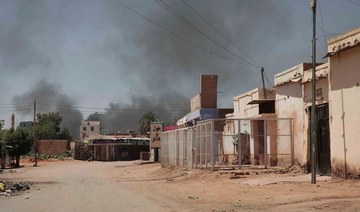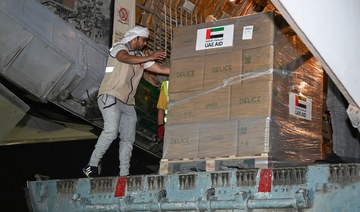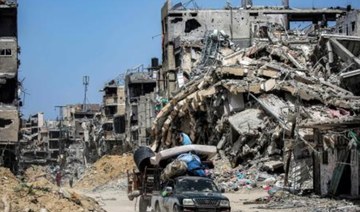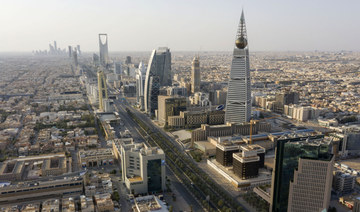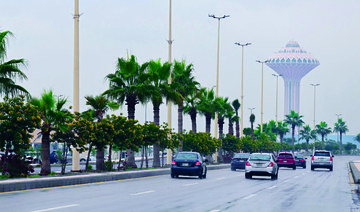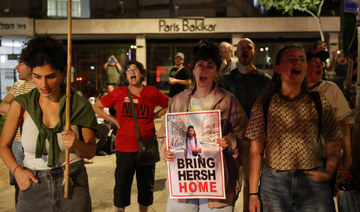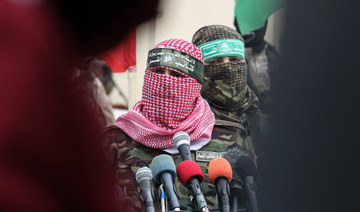PORT SUDAN, Sudan: The UN’s humanitarian chief arrived in Sudan’s main seaport on Wednesday, as thousands of Sudanese and foreign nationals gathered there in hopes of fleeing the conflict-torn east African country.
Martin Griffiths, the under-secretary-general for humanitarian affairs and emergency relief coordinator at the United Nations, tweeted that he came to affirm the UN’s commitment to the Sudanese people. His arrival in Port Sudan on the Red Sea came on the last day of a shaky truce, meant to expire at midnight, which has not quelled the fighting.
There are also increasing concern about the humanitarian situation for those trapped and displaced by the fighting — the result of a power struggle between the country’s two top generals — but questions remain over how UN agencies can operate with limited staff and supplies amid the chaos.
More than a week after the brutal fighting erupted in the country’s capital on Khartoum on April 15, thousands of UN workers were evacuated in a convoy to Port Sudan. Some UN offices paused their services, such as the World Food Program, after two of its workers were killed in fighting in southern Sudan. The WFP has since said it will resume operations.
The battle for control of Sudan erupted after months of escalating tensions between the military, led by Gen. Abdel-Fattah Burhan, and a rival paramilitary group called the Rapid Support Forces, commanded by Gen. Mohamed Hamdan Dagalo.
At a virtual news conference from Port Sudan, Griffiths said he is seeking guarantees from the warring sides for the safe passage of humanitarian aid. He addressed criticism that the UN had not been doing enough by saying it was “extremely difficult” to work in Sudan. Even before the fighting erupted last month, Sudan was a country where one third of the population relied on humanitarian assistance.
Six trucks belonging to the World Food Program carrying aid to the western region of Darfur were looted on the road, Griffiths said, and singled out Darfur and Khartoum as badly in need of assistance.
“It’s not as if we’re asking for the moon,” Griffiths said in the online briefing. “We’re asking for the movement of humanitarian supplies and people. We do this in every other country, even without cease-fires.”
The conflict has so far killed 550 people, including civilians, and wounded more than 4,900. The fighting has displaced at least 334,000 people inside Sudan, and sent tens of thousands more to neighboring countries — Egypt, Chad, South Sudan, the Central African Republic and Ethiopia, according to UN agencies.
More than 42,000 Sudanese who fled the war in their country have crossed into Egypt along with 2,300 foreign nationals since the crisis began, according to the UN refugee agency. Aid workers are increasingly concerned about lack of basic services in these areas, and also in Port Sudan, some 400 kilometers (250 miles) from Khartoum.
Many Western countries have completed evacuations for their citizens from the country, with France, Britain and now the United States using Port Sudan as a base for those looking to leave. But citizens of other nations are still struggling to find a way out.
An estimated hundreds of Syrians, who came to Sudan fleeing their own country’s civil war over the past decade, are among the last foreigners to leave.
Tariq Abdel-Hameed, a Syrian in Port Sudan, said a second Damascus-bound flight with a around 200 Syrians mostly pregnant women and sick people, is scheduled to take off from Port Sudan later Wednesday.
He said the first flight landed in the Syrian capital early Wednesday, with some 200 people, including 21 children, on board. He said more flights are scheduled in the coming days.
For thousands of Sudanese and foreigners flocking to Port Sudan, it’s the last stop before leaving the country. Saudi warships have been ferrying mainly foreigners but also dual Sudanese nationals and others across the Red Sea to the Saudi city of Jeddah.
“It feels really sad to be leaving behind a part of your life,” said Saadiya Abdulrahman, a Sudanese-American woman from Khartoum, while waiting with her daughter for their turn to board a Saudi vessel on Tuesday night. When their turn came, the two first boarded a tugboat with dozens of others, to take them to the Saudi ship.
“Khartoum has become like a ghost town in some neighborhoods because of all the destruction,” said Salah Suleiman, a Sudanese from Khartoum who was among those sailing to Jeddah.
On Wednesday, the fighting continued in and around the Sudanese capital. Clouds of smoke were seen over areas of active fighting, and residents-hiding in their homes-still heard sounds of explosions, with the battles still seemingly centered around key government buildings, such as the Presidential Palace.
There were increasing signs of lawlessness in many of the city’s neighborhoods, with reports that more diplomatic facilities were being targeted. Armed men stormed the building housing the office of Saudi Arabia’s cultural attaché in Sudan, the kingdom said Wednesday.
A statement on the state-run Saudi Press Agency said an armed group “destroyed equipment and cameras, seized some of attaché’s property and disrupted the attaché’s systems and servers.”
Speaking from Kenya, UN Secretary-General Antonio Guterres said the international community needs to come together and put pressure on the warring Sudanese generals to end the conflict.
“All need to use their capacity to put pressure for this horrible and I’d say unjustifiable conflict to stop,” he said. “The present situation is totally unacceptable.”
UN humanitarian chief in Sudan, seeking guarantees on aid
https://arab.news/wnwht
UN humanitarian chief in Sudan, seeking guarantees on aid
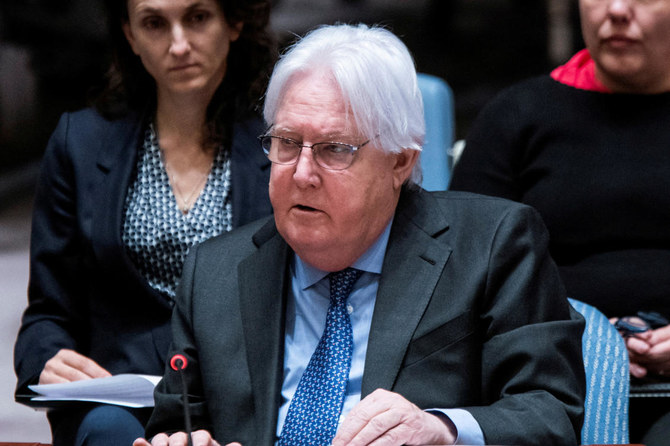
- More than a week after the brutal fighting erupted in the country's capital on Khartoum on April 15, thousands of UN workers were evacuated in a convoy to Port Sudan
- Some UN offices paused their services, such as the World Food Program, after two of its workers were killed in fighting in southern Sudan
EU commits $73 million more for Gaza aid

- New EU aid would be focused on food deliveries, clean water, sanitation and shelters
- The EU and United States have demanded that Israel allows more aid into Gaza
BRUSSELS: The European Union on Friday said it was giving an extra 68 million euros ($73 million) to provide desperately needed aid to Palestinians in Gaza.
The territory has been devastated by more than six months of Israeli bombardment and ground operations after Hamas’s October 7 attack, leaving the civilian population of two million people in need of humanitarian assistance to survive.
“In light of the continued deterioration of the severe humanitarian crisis in Gaza, and the steady rise of needs on the ground, the (European) Commission is stepping up its funding to support Palestinians affected by the ongoing war,” an EU statement said.
“This support brings total EU humanitarian assistance to 193 million euros for Palestinians in need inside Gaza and across the region in 2024.”
The EU said the new aid would be focused on food deliveries, clean water, sanitation and shelters, and would be channelled through local partners on the ground.
The United Nations has said Israel’s operation has turned Gaza into a “humanitarian hellscape,” amid fears of a looming famine.
The EU and United States have demanded that Israel allows more aid into Gaza.
The US military said on Thursday it had begun construction of a pier meant to boost deliveries to the territory.
The war in Gaza began with an unprecedented Hamas attack on Israel on October 7 that resulted in the deaths of about 1,170 people in Israel, according to an AFP tally of Israeli official figures.
Israel vowed to destroy Hamas, with a retaliatory offensive that has killed at least 34,356 people in Gaza, mostly women and children, according to the Hamas-run territory’s health ministry.
Egypt sending ceasefire delegation to Israel
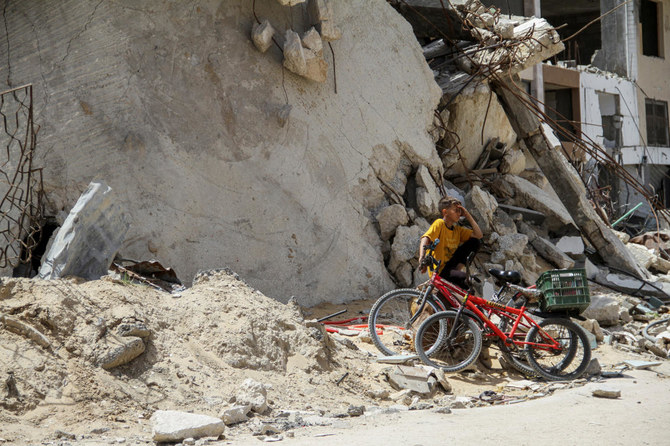
- Egyptian intelligence chief Abbas Kamel plans to make clear that Egypt ‘will not tolerate’ Israel’s deployments of troops along Gaza’s borders with Egypt
Egypt is sending a high-level delegation to Israel in the hope of reaching a ceasefire agreement with Hamas in Gaza, while warning a possible new Israeli offensive focused on the southern city of Rafah on the border with Egypt could have catastrophic consequences for regional stability, two officials said Friday.
While in Israel, Egyptian intelligence chief Abbas Kamel plans to make clear that Egypt “will not tolerate” Israel’s deployments of troops along Gaza’s borders with Egypt, an Egyptian official said, speaking on condition of anonymity to freely discuss the mission.
Earlier Friday, Lebanon’s militant Hezbollah group fired anti-tank missiles and artillery shells at an Israeli military convoy in a disputed area along the border, killing an Israeli civilian, the group and Israel’s military.
Hezbollah said that its fighters ambushed the convoy shortly before midnight Thursday, destroying two vehicles. The Israeli military said the ambush wounded an Israeli civilian doing infrastructure work, and that he later died of his wounds.
Low-intensity fighting along the Israel-Lebanon border has repeatedly threatened to boil over as Israel has targeted senior Hezbollah militants in recent months.
Tens of thousands of people have been displaced on both sides of the border. On the Israeli side, the cross-border fighting has killed 10 civilians and 12 soldiers, while in Lebanon, more than 350 people have been killed, including 50 civilians and 271 Hezbollah members.
On Thursday, Palestinian hospital officials said Israeli airstrikes on the southern city of Rafah in the Gaza Strip killed at least five people.
More than half of the territory’s population of 2.3 million have sought refuge in Rafah, where Israel has conducted near-daily raids as it prepares for an offensive in the city. The Israeli military has massed dozens of tanks and armored vehicles in the area in what appears to be preparations for an invasion of Rafah.
In central Gaza, four people were killed in Israeli tank shelling.
A ship traveling in the Gulf of Aden came under attack Thursday, officials said, the latest assault likely carried out by Yemen’s Houthi rebels over the Israel-Hamas war.
Meanwhile, a top Hamas political official said that the Islamic militant group is willing to agree to a truce of five years or more with Israel.
The Israel-Hamas war was sparked by the unprecedented Oct. 7 raid into southern Israel in which militants killed around 1,200 people, mostly civilians, and abducted around 250 hostages. Israel says the militants are still holding around 100 hostages and the remains of more than 30 others.
The war has killed more than 34,000 Palestinians, according to local health officials, around two-thirds of them children and women.
Sheikh Mansour bin Zayed receives Saudi envoy in Abu Dhabi
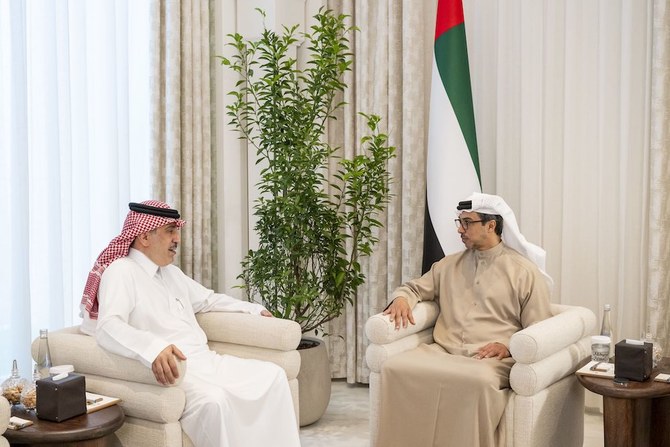
DUBAI: Sheikh Mansour bin Zayed Al-Nahyan, Vice President, Deputy Prime Minister and Chairman of the Presidential Court, has received Sultan bin Abdullah Al-Anqari, Saudi Arabia’s ambassador to the UAE.
During a meeting at Qasr Al-Shati in Abu Dhabi, the two officials discussed relations between the two countries and ways to enhance cooperation that would be beneficial to both nations, state news agency WAM said.
Sheikh Mansour emphasized the robust ties between the UAE and Saudi Arabia are underpinned by the leadership of both countries.
US military starts pier construction off Gaza

- But humanitarian aid coming off the pier will need to pass through Israeli checkpoints on land
- Despite the aid having already been inspected by Israel in Cyprus prior to being shipped to Gaza
WASHINGTON: US troops have begun construction of a maritime pier off the coast of Gaza that aims to speed the flow of humanitarian aid into the enclave when it becomes operational in May, the Pentagon said on Thursday.
President Joe Biden announced the pier in March as aid officials implored Israel to ease access for relief supplies into Gaza over land routes. Whether the pier will ultimately succeed in boosting humanitarian aid is unclear, as international officials warn of the risk of famine in northern Gaza.
Israel’s six-month-long military campaign against Hamas has devastated the tiny Gaza Strip and plunged its 2.3 million people into a humanitarian catastrophe.
A senior Biden administration official, speaking to reporters on condition of anonymity, said humanitarian aid coming off the pier will need to pass through Israeli checkpoints on land. That is despite the aid having already been inspected by Israel in Cyprus prior to being shipped to Gaza. Israel wants to prevent any aid getting to Hamas fighters that boosts their war effort.

The prospect of checkpoints raises questions about possible delays even after aid reaches shore. The United Nations has long complained of obstacles to getting aid in and distributing it throughout Gaza.
“I can confirm that US military vessels, to include the USNS Benavidez, have begun to construct the initial stages of the temporary pier and causeway at sea,” Pentagon spokesperson Major General Patrick Ryder told reporters.
Concerns about the risk to American troops getting caught up in the Israel-Hamas war were underscored on Thursday as news emerged of a mortar attack near the area where the pier will eventually touch ground. No US forces were present, however, and Biden has ordered US forces to not step foot on the Gaza shore.
The pier will initially handle 90 trucks a day, but that number could go up to 150 trucks daily when it is fully operational. The United Nations said this week that the daily average number of trucks entering Gaza during April was 200 and that there had been a peak on Monday of 316.
The official added that about 1,000 US troops would support the military effort, including in coordination cells in Cyprus and Israel.
A third party will be driving trucks down the pier onto the beach, the official added.
The northern Gaza Strip is still heading toward a famine, the deputy UN food chief said on Thursday, appealing for a greater volume of aid and for Israel to allow direct access from its southern Ashdod port to the Erez crossing.
In a statement, the Israeli military said it would provide security and logistics support for the pier.
An Israeli military brigade, which includes thousands of soldiers, along with Israeli Navy ships and Air Force would work to protect US troops who are setting up the pier.
Ryder said the Pentagon was tracking some type of mortar attack in Gaza that caused minimal damage in the marshalling area for the pier. But he added that US forces had not started moving anything to that area yet and there were no US forces on the ground.
Hamas official says Israel ‘will not achieve’ goals in Rafah
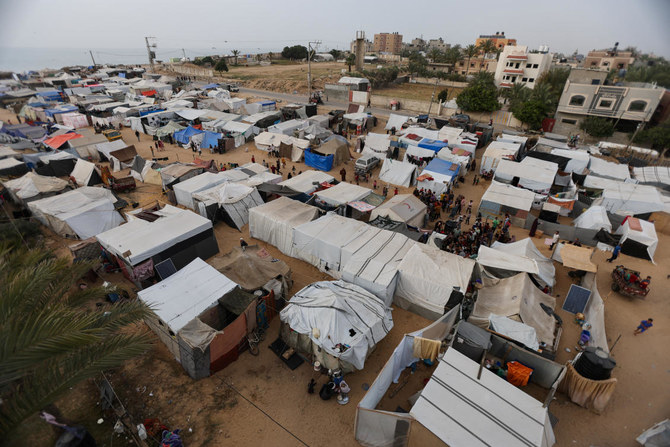
- “Even if (Israel) enters and invades Rafah, it will not achieve what it wants,” Ghazi Hamad said
- “This will undoubtedly threaten the negotiations because it is clear from this declared position that Israel is interested in continuing the war“
GAZA STRIP, Palestinian Territories: A senior Hamas official told AFP on Thursday that Israel would fail to meet its stated goals of defeating the Palestinian militant group and freeing hostages by invading the southern Gaza city Rafah.
“Even if (Israel) enters and invades Rafah, it will not achieve what it wants,” Ghazi Hamad said in an interview over the phone from Qatar, where a number of senior figures from Hamas’s political bureau are based.
Hamad said Israel had “spent nearly seven months in Gaza and invaded all areas and destroyed a lot, but so far has not been able to achieve anything of its main goals, whether eliminating Hamas or returning the captives.”
Israel has vowed to move on with the planned military operation in Rafah, despite international outcry and concern for about 1.5 million Palestinians sheltering in the city.
There are fears of huge civilian casualties and countries including Israel’s top ally and weapons supplier the United States have warned Israel against sending troops into Rafah.
“We have spoken with all parties involved in the conflict... about the seriousness of invading Rafah and that Israel is heading toward committing additional massacres and additional genocide,” Hamad said.
“This will undoubtedly threaten the negotiations because it is clear from this declared position that Israel is interested in continuing the war and aggression and has no intention of continuing negotiations and reaching an agreement,” he said.
Qatar, the United States and Egypt, have been mediating talks to secure a truce and the release of hostages, but those have stalled for days.
An Egyptian delegation is however set to travel to Israel on Friday to kickstart a new round of talks, Israeli media reported citing unnamed officials.
Israeli government spokesman David Mencer said Israel’s war cabinet was meeting Thursday “to discuss how to destroy the last battalions of Hamas.”
On Wednesday, Mencer said that since Israel began its ground invasion of Gaza on October 27, the army has destroyed “at least 18 or 19 of Hamas’s 24 battalions.”
Officials say the remaining battalions are in Rafah — the main target of the impending assault.
Most Gazans taking refuge in Rafah are sheltering in makeshift camps, and even before the start of the expected ground invasion, the city near the Egyptian border has been suffering regular Israeli bombings.
Hamad argued the planned invasion was exposing contradictions in Israeli Prime Minister Benjamin Netanyahu’s stance on Gaza.
“Netanyahu is stumbling because, on the one hand, he wants to return the captives to their families, as he says, but at the same time, he puts them in great danger, as his army deliberately killed many hostages.”
Israel’s army has admitted to mistakenly killing some hostages in Gaza.
Hamad accused Netanyahu of “manipulating and procrastinating” in a bid to “deceive the Israeli public that there are negotiations and deceive the international community as well that there are negotiations.”
He said the Israeli prime minister was “trying to twist the truth” and claim that “Hamas is the obstacle in these negotiations.”
Hamad said Qatar and Egypt were “making great efforts to reach an agreement,” but argued “the Israeli side unfortunately deals with the matter foolishly and is very confused.”
Hamad also told AFP that Hamas, which took power in Gaza in 2007, was already working on plans for the territory after the war.
He said the group was “working on the post-war phase to ensure that there is a great effort to rebuild the Gaza Strip and provide the necessities for a decent life.”
Palestinian militants took around 250 hostages to Gaza during Hamas’s October 7 attack that triggered the war.
Israeli officials say 129 hostages are still held in Gaza, including 34 the military says are dead.
The attack on southern Israel resulted in the deaths of 1,170 people, Israelis and foreigners, according to an AFP tally based on official Israeli figures.
Israel’s retaliatory offensive against Hamas in Gaza has killed 34,305 people, most of them women and children, according to the territory’s health ministry.



